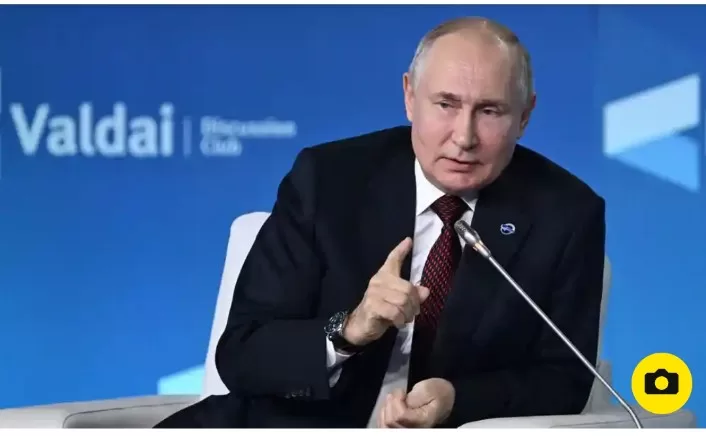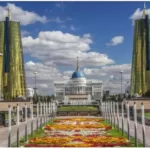Russia’s Ambassador to the Comprehensive Nuclear Test Ban Treaty Organization (CTBTO) has declared Moscow’s intention to revoke its ratification of the Comprehensive Nuclear-Test-Ban Treaty, an announcement met with condemnation from Washington, which views it as a threat to the international norm against nuclear test explosions.
Mikhail Ulyanov’s announcement on Friday further exacerbated tensions between Russia and the United States, stemming from Moscow’s incursion into Ukraine and disputes over arms control in a world dominated by the two largest nuclear powers.
Ulyanov, serving as Moscow’s envoy to the CTBTO, conveyed the message via X, formerly known as Twitter, stating, “#Russia plans to revoke ratification (which took place in the year 2000) of the Comprehensive Nuclear-Test-Ban Treaty.
“The aim is to be on equal footing with the #US who signed the Treaty, but didn’t ratify it. Revocation doesn’t mean the intention to resume nuclear tests.”
While the United States signed but did not ratify the treaty, it has maintained a moratorium on nuclear weapon test explosions since 1992, affirming that it has no plans to abandon this commitment.
In response to Ulyanov’s statements, a spokesperson from the US State Department expressed concern, remarking, “We are disturbed by the comments of Ambassador Ulyanov in Vienna today. A move like this by any state party needlessly endangers the global norm against nuclear explosive testing.”
Robert Floyd, the Executive Secretary of the Comprehensive Nuclear-Test-Ban Treaty Organization (CTBTO), emphasized that it would be “concerning and deeply unfortunate if any state signatory were to reconsider its ratification of the CTBT.”
Russian President Vladimir Putin had previously hinted at the possibility of Russia rescinding its ratification of the 1996 CTBT agreement to “mirror” the United States.
Speaking in Sochi on Thursday, Putin made multiple references to nuclear weapons, remarking, “I am not ready to say now whether we really need or don’t need to conduct tests.”
“As a rule, experts say, with a new weapon – you need to make sure that the special warhead will work without failures,” Putin stated.
A Russian nuclear test would represent the first such test since 1990, the last conducted by the Soviet Union. Renewed testing by a nuclear superpower would unravel one of the pivotal achievements in non-proliferation efforts since the Cold War.
Since Russia’s comprehensive invasion of Ukraine in February 2022, Putin and other Russian officials have frequently underscored the country’s possession of the world’s largest nuclear arsenal, aiming to deter other nations from assisting Ukraine in resisting the invasion.
Vyacheslav Volodin, the Chairman of the State Duma, the lower house of parliament, conveyed that Putin’s statements would prompt swift consideration regarding the revocation of Russia’s CTBT ratification.
Last week, Mikhail Kovalchuk, a close associate of Putin and head of the Kurchatov Institute research center, suggested that Russia might conduct a nuclear test “at least once” at Novaya Zemlya, an Arctic archipelago historically used for testing by the Soviet Union.
Satellite images from Novaya Zemlya, published recently by the Middlebury Institute of International Studies at Monterey, disclosed signs of recent construction activity at the old test site.
The institute also identified indications of activities at the former US testing ground in the Nevada desert and the Chinese site in Xinjiang province, underscoring the CTBT’s increasing fragility amid escalating international tensions and the modernization of nuclear arsenals by the world’s nuclear powers.
During Donald Trump’s administration, national security officials discussed the possibility of resuming US nuclear tests for the first time since 1992.
In his Sochi remarks, Putin asserted that Russia had successfully tested an experimental nuclear-powered cruise missile known as the Burevestnik and was close to producing a novel nuclear-capable ballistic missile.
Heather Williams, Director of a project on nuclear issues at the Center for Strategic and International Studies, remarked, “A Russian nuclear test in the near future would be the latest in a stream of nuclear signals related to the war in Ukraine, which often come when Russia is facing battlefield losses. Nonetheless, these threats should be taken seriously. If Russia withdrew ratification from the CTBT or did test a nuclear weapon, this would be a major strategic and diplomatic provocation.
“It would undermine one of the few remaining agreements managing nuclear risk, since Russia suspended participation in the 2010 New Start treaty earlier this year.”
The CTBT, open for signature since 1996, has been signed by 187 nations and ratified by 178. However, for the test ban to become effective, it necessitates ratification by 44 states that took part in negotiating the agreement and had nuclear power or research reactors at that time.
Among these 44 states, eight have yet to ratify the ban: China, North Korea, Egypt, India, Iran, Israel, Pakistan, and the United States.
Reuters contributed to this report.




